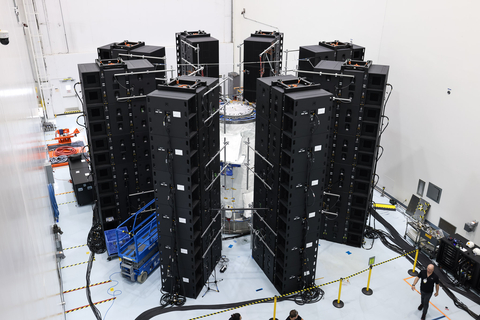Sierra Space Shooting Star® Cargo Module Completes Acoustic Testing at NASA's Kennedy Space Center
Sierra Space Shooting Star® Cargo Module Completes Acoustic Testing at NASA's Kennedy Space Center
Dream Chaser® Spaceplane’s Cargo Companion Subjected to Sound Forces Simulating the Extreme Noise Levels of a Rocket Launch
LOUISVILLE, Colo.--(BUSINESS WIRE)--Sierra Space, a leading commercial space company and defense tech prime that is Building a Platform in Space to Benefit Life on Earth®, announced today the successful completion of acoustic testing on its Shooting Star® cargo module at NASA’s Kennedy Space Center, moving the spacecraft a significant step closer to launch readiness. The test, the first of its kind to be conducted inside the Space Systems Processing Facility (SSPF), replicated the intense acoustic stresses Shooting Star will need to withstand during a Vulcan Centaur rocket launch to the International Space Station (ISS).
During the Direct Field Acoustic Test (DFAN), the test team placed stacks of purpose-built loudspeakers – each one a highly-engineered acoustic device – in 21-ft-tall columns surrounding the spacecraft. Their goal was to test whether the structural elements of Shooting Star could withstand the acoustic environment of a launch on a Vulcan Centaur rocket. Over a four-day period, test engineers blasted the spacecraft with a controlled sound field that was 10,000x higher intensity than the volume of a typical rock concert, recreating the sonic intensity of a launch. Shooting Star withstood acoustic levels greater than 140 dB for several minutes at a time, proving its flight worthiness.
“Our innovative Shooting Star cargo module offers the capability to deliver additional capacity, flexibility and power to a wide range of missions," said Sierra Space CEO, Tom Vice. “In our first mission, Shooting Star will carry critical science, food and cargo to the International Space Station for NASA, and our cargo modules will continue to play an integral role in bringing supplies to space as we build a Low Earth Orbit economy through commercial spaceflight.”
Shooting Star attaches to the aft of Sierra Space’s Dream Chaser®, adding 7,000 lbs. of supplemental cargo capacity to the spaceplane, while its solar arrays and thrusters provide power and additional propulsion to both spacecraft. The acoustic testing at Kennedy Space Center was performed with a mobile setup provided by West Virginia-based Acoustic Research Systems, Inc.; it was the first time onsite acoustic testing has ever been conducted inside the SSPF, NASA’s historic staging location for space station-bound components.
“Our goal is to accurately simulate real world launch conditions to make sure Sierra Space’s Shooting Star cargo module is ready for its first mission to the International Space Station,” said ARS CEO, Jeremiah Leiter. “The ARS team rose to the challenge, setting up a mobile configuration onsite at Kennedy Space Center – for the first time ever inside the Space Systems Processing Facility – providing Sierra Space with critical acoustic qualification testing. We look forward to supporting Sierra Space with the upcoming Dream Chaser acoustic test.”
ARS used a total of 48 acoustic devices during the cargo module testing. The company’s Neutron™ System is an industry first, consisting of proprietary, purpose-built acoustic devices made for high-output aerospace acoustic testing. ARS will be using an even larger setup for Sierra Space’s Dream Chaser spaceplane; the impending test will be the largest payload ever tested with DFAN.
About Sierra Space
Sierra Space is a leading commercial space company at the forefront of innovation and the commercialization of space in the Orbital Age®, building an end-to-end business and technology platform in space to benefit life on Earth. With more than 30 years and 500 missions of space flight heritage, the company is reinventing both space transportation with Dream Chaser®, the world’s only commercial spaceplane, and the future of space destinations with the company’s inflatable and expandable space station technology. Using commercial business models, the company is also delivering orbital services to commercial, DoD and national security organizations, expanding production capacity to meet the needs of constellation programs. In addition, Sierra Space builds a host of systems and subsystems across solar power, mechanics and motion control, environmental control, life support, propulsion and thermal control, offering myriad space-as-a-service solutions for the new space economy.
Contacts
Alex Walker, Sierra Space
(303) 803-2297 | alex.walker@sierraspace.com

